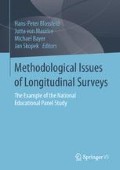Abstract
Measuring the Big Five personality traits is part of the research program in different starting cohorts of the National Educational Panel Study (NEPS). The Big Five are usually measured through self-ratings via self-administered questionnaires. However, children of preschool age cannot easily report on their self-concept in a sufficient way, even when more extensive research settings are applied. Studies using parental and teacher ratings show that the Big Five can capture individual differences in the behavioral tendencies of children (Digman, 1990; Mervielde, 2005; Weinert, Asendorpf, Beelmann, Doil, & Frevert, 2007), but there are no short survey versions of the Big Five for parental ratings that are done via telephone interviewing. In order to obtain data on the Big Five of five-year-old children in the NEPS, we used a bipolar 10-item scale and asked parents and Kindergarten teachers to rate the children. Since the parents answered questions in computer-assisted telephone interviews (CATI), we adapted the items to this mode of surveying. In order to gather information on measuring the Big Five in this bipolar rating scale via telephone interviews, we conducted cognitive interviews with n = 15 parents and then tested two different versions within a split-half design in a pilot study (with total n = 89 parents). This paper presents results from cognitive interviews on parents’ abilities to rate their children’s behavior in this way. We compare the results of the two versions applied in the pilot study as well as the ratings of Kindergarten teachers and parents. Finally, our paper draws conclusions on the measurement of personality traits of young children within the NEPS.
Access this chapter
Tax calculation will be finalised at checkout
Purchases are for personal use only
Preview
Unable to display preview. Download preview PDF.
References
Asendorpf, J. B., & van Aken, M. A. G. (2003). Validity of big five personality judgments in childhood: A 9 year longitudinal study. European Journal of Personality, 17(1), 1–17.
Digman, J. M. (1990). Personality structure: Emergence of the five-factor model. Annual Review of Psychology, 41(1), 417 – 440.
Hofstee, W. K. B. (2003). Structures of personality traits. In T. Millon, & M. J. Lerner (Eds.), Handbook of psychology (pp. 231 – 254). Hoboken, NJ: John Wiley & Sons.
Kohnstamm, G. A., Mervielde, I., Besevegis, E., & Halverson, C. F. (1995). Tracing the big five in parents’ free descriptions of their children. European Journal of Personality, 9(4), 283 – 304.
McCrae, R. R., & Costa, P. T. (1987). Validation of the five-factor model of personality across instruments and observers. Journal of Personality and Social Psychology, 52(1), 81–90.
Measelle, J. R., John, O. P., Ablow, J. C., Cowan, P. A., & Cowan, C. P. (2005). Can children provide coherent, stable, and valid self-reports on the big five dimensions ? A longitudinal study from ages 5 to 7. Journal of Personality and Social Psychology, 89(1), 90–106.
Mervielde, I. (2005). Persönlichkeitsbeurteilung aus entwicklungspsychologischer Perspektive. In J. B. Asendorpf (Ed.), Enzyklopädie der Psychologie: Themenbereich C:
Theorie und Forschung. Serie V: Entwicklungspsychologie (pp. 563 – 616). Göttingen: Hogrefe.
Mervielde, I., Buyst, V., & de Fruyt, F. (1995). The validity of the big-five as a model for teachers’ ratings of individual differences among children aged 4–12 years. Personality and Individual Differences, 18(4), 525 – 534.
Prüfer, P., & Rexroth, M. (2005). Kognitive Interviews (ZUMA How-to-Reihe No. 15). Mannheim: Zentrum für Umfragen, Methoden und Analysen.
Schlechter, S., Blair, J., & Hey, J. V. (1996). Conducting cognitive interviews to test selfadministered and telephone surveys: Which methods should we use ? In American Statistical Association (Ed.), Proceedings of the survey research methods section (pp. 10–17). Alexandria, V. A.: American Statistical Association.
Weinert, S., Asendorpf, J. B., Beelmann, A., Doil, H., & Frevert, S. (Eds.). (2007). Expertise zur Erfassung von psychologischen Personmerkmalen bei Kindern im Alter von fünf Jahren im Rahmen des SOEP (DIW Data Documentation No. 20). Berlin: Deutsches Institut für Wirtschaftsforschung.
Willis, G. B. (2005). Cognitive interviewing: A tool for improving questionnaire design. Thousand Oaks: Sage Publications.
Author information
Authors and Affiliations
Corresponding author
Editor information
Editors and Affiliations
Rights and permissions
Copyright information
© 2016 Springer Fachmedien Wiesbaden
About this chapter
Cite this chapter
Müller, D., Linberg, T., Bayer, M., Schneider, T., Wohlkinger, F. (2016). Measuring Personality Traits of Young Children— Results From a NEPS Pilot Study. In: Blossfeld, HP., von Maurice, J., Bayer, M., Skopek, J. (eds) Methodological Issues of Longitudinal Surveys. Springer VS, Wiesbaden. https://doi.org/10.1007/978-3-658-11994-2_10
Download citation
DOI: https://doi.org/10.1007/978-3-658-11994-2_10
Published:
Publisher Name: Springer VS, Wiesbaden
Print ISBN: 978-3-658-11992-8
Online ISBN: 978-3-658-11994-2
eBook Packages: EducationEducation (R0)

